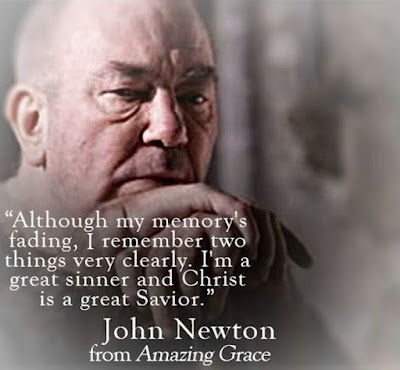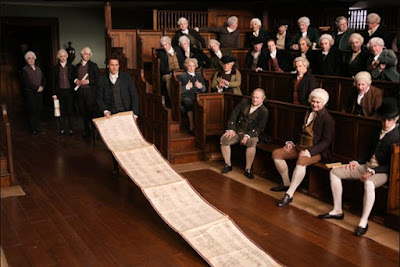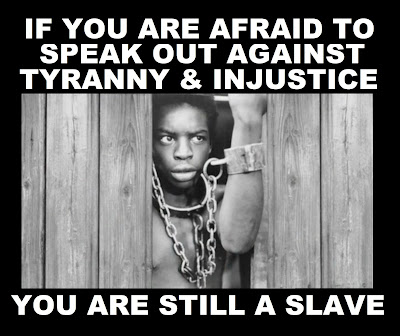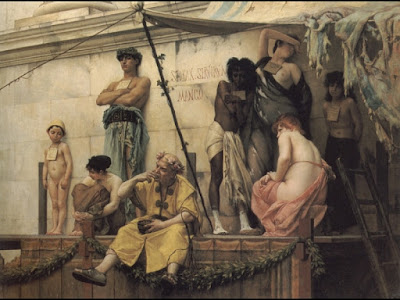“AMAZING GRACE”
Amazing Grace, how sweet the soundThat saved a wretch like meI once was lost, but now am foundWas blind but now I see
Was Grace that taught my heart to fearAnd Grace, my fears relievedHow precious did that Grace appearThe hour I first believed
I’m sure, almost everyone could hear this song
at least once in their life. Although many know that, not everyone is aware of
its origin. Here you can hear one of the most popular this song ‘s rendition
connected with the Great Britain culture in which the song is usually associated.
Amazing grace played at Wells Bridge Fire Department Pavillion on June 3, 2006, by "Rocks From The Garden",
Joannie (vocal) and Randy(guitar).
What are the origins of "Amazing Grace"?
"Amazing Grace" is surely one of the
most recognizable hymns in the English-speaking world. The words were written
in 1772 by the Englishman John Newton and published anonymously in 1779 as a part of a poem entitled
"Olney Hymns". After almost a century, in 1847, Newton's rhyme was
set to the "New Britain" tune and given the title "Amazing
Grace". In that shape the song appeared for the first time in Walker's
tunebook "Southern Harmony" in 1847.
 |
Albert Finney as John Newton, the photo from the movie “Amazing Grace”
|
John Newton was working as a slave ship master bringing the slaves from Africa to England. After one of his sea voyages his ship almost sank and he survived miraculously. Newton realised his salvage was only by God’s grace and decided to turn his life around and became a clergyman and poet. “Amazing Grace” was written from his personal experiences with words which were borne from his heart.
 |
| Engraving of the vicarage at Olney where John Newton spent his first years as a minister, 1879. |
Why is "Amazing Grace" known as the anti-slavery hymn?
After several years of working in a British
parish John Newton started to gain popularity as a well-educated preacher, a
poet and writer. It started when he became the spiritual father of William
Wilberforce when he was a boy and in the forthcoming years was reaching gradually
more and more influence on the young politician and philanthropist. Talking
about his slave trader work in the past he emphasized that he still couldn’t
find peace because of his memories of suffering slaves which were still fresh.
 |
| William Wilberforce (1759 – 1833) , source: Wikipedia. |
To make a greater impression on his young ward
he repeated that all the time during his work as a preacher, he was living in
the company of 20 thousand ghosts of black slaves who died of diseases and
hunger during the shipping when he was a captain and a slave master. Thereby,
one day he happened to be just that person, who had a great impact on William
Wilberforce; leader or the parliamentary campaign to abolish the African slave
trade (Black Slavery).

Ioan Gruffudd as William Wilberforce – a photo from the movie “Amazing Grace” (2006)

| Ioan Gruffudd as William Wilberforce – a photo from the movie “Amazing Grace” (2006) |
The popularity of the song.
The project succeeded after many years of
making endeavours. William Wilberforce and his companions, one of whom was John
Newton, ultimately met the target thanks to having collected evidences of the
cruelty of slave traders who treated Africans as if they were animals, and also
thanks to emphasized high rate of death among the black people transported on
ships and their endless torments during their lives in slavery in Europe. After long years of fighting, the "Slave
Trade Act" was ultimately signed in 1807 and from that time onward the
song "Amazing Grace" has been associated with the idea of resistance
to every kind of slavery. The movie "Amazing Grace" (2006) made this
connotation even more obvious.
Was Africa free after the slave trade abolishment in Great Britain?
After abolishing the slavery in Great Britain,
other countries started to change their policies step by step to change the law
and stop the slave trade. But the dealings were still valid in America’s law
due to the fact that having the unpaid workers was a guarantee of good
prosperity, especially that in the eyes of the law they had no more rights than
animals. Slaves could be sold anytime, severely punished for every disobedience
and could be used for sexual pleasures or even killed during penalizing. They
never could decide for themselves, love, personal ambitions and dreams were
forbidden. Even after they got married they couldn’t be sure that their
children would live with them, because they could be sold anytime. The times
have changed now – there’s no slavery in the world and all the black people are
now said to be free and have the same rights as the whites. Everyone seems to
be equal and enjoy the same human rights, but is that really so?
Why is racism still a real problem? George
Flloyd’s death has reminded us about the necessity to fight any injustice
towards people of different skin colour, place of living, religion and culture.
 |
| Josiah Wedgwood, The Official Medallion of the British Anti-Slavery Society, 1787 |
Is Africa free now?
Did Great Britain lost their benefits after
the slave trade abolishment? I don’t think so… When the Slave Trade Act was
about to be claimed as invalid the Great Britain was already an owner of large
territories in Africa like Sierra Leone, Gambia and later the Kingdom of Lagos
and the Northern and Southern Nigeria. By the coming years Great Britain was
buying more and more areas in Africa and in the end became the biggest
colonialist growing rich due to the petroleum fields which were found in
Africa. In the 20th century the colonies got independence but Great Britain
maintained the influence they had on the Africa governments to be able to reap
the further rewards from the oil. One of the largest crude oil sources was discovered
in Niger delta of the Federal Republic of Nigeria; Olubiri in Bayelsa state which in fact induced Great Britain's political decisions about their involvement in Nigeria's economy. Protecting their oil interests was also a
reason, why Great Britain supported the Federal Government of Nigeria and
supplied them with weapons during the Nigeria civil war against Biafra between
1967-1970.
 |
Coat of Arms of the Republic of Biafra
|
The acceptance of secession would be a great risk of losing profits from the oil trade, which could be a very big danger for British economy. Of course in the wake of European support Biafra fell and returned to Nigeria, so the UK and now the USA can still benefit a lot from the oil exploitation while Nigerians have little or no profit from the oil extractions and struggle with poverty and hunger. This hasn’t changed for centuries. It begs the question: Are the African people really free now? Is really the “Amazing Grace” the anti-slavery song or only a mocker which has kept quiet people’s conscience?
 | |
|
Through many dangers, toils and snaresWe have already comeT'was Grace that brought us safe thus farAnd Grace will lead us homeAmazing Grace, how sweet the soundThat saved a wretch like meI once was lost but now am foundWas blind but now I see(John Newton, 1772)
Written by: Cecylia Buczko
 |
| Cecylia Buczko |



Brak komentarzy:
Prześlij komentarz